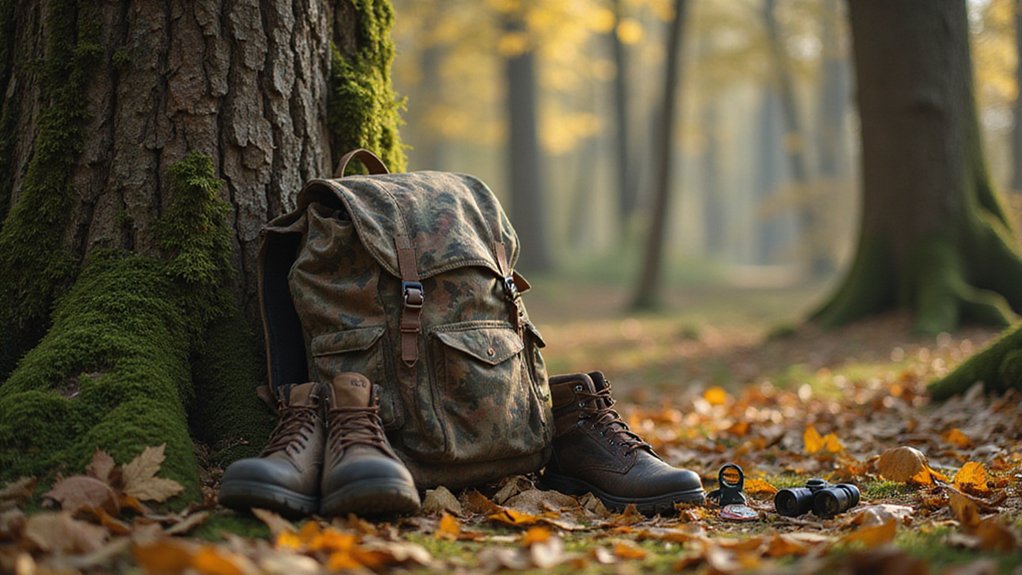Preparing for a hunting trip requires careful planning and attention to detail. You need to understand the terrain, check your gear, and consider local regulations. It’s also essential to scout the area for game trails and identify potential hazards. Each step plays a vital role in ensuring a successful outing. But what should you pack, and how do you choose the right gear? Let’s explore these important aspects.
How to Prepare for a Hunting Trip: Key Steps to Follow
Before you head out on your hunting trip, it’s essential to take a few key steps to guarantee a successful experience.
First, research the area you’ll be hunting in; know the terrain, weather conditions, and local regulations.
Next, scout the location ahead of time to identify potential game trails and feeding areas.
Confirm your gear’s in top shape; check your weapon, clothing, and safety equipment.
Finally, inform someone about your plans and estimated return time for safety.
What to Pack for Your Hunting Adventure?
When planning your hunting adventure, packing the right gear is crucial to guarantee a successful trip. Start with your weapon—whether it’s a rifle or bow—along with necessary ammunition or arrows. Don’t forget a sturdy knife for field dressing.
Comfortable, weather-appropriate clothing is important, including camouflage and layers to adapt to changing conditions. Pack a reliable backpack, a first aid kit, and plenty of food and water.
Binoculars and a map can help with navigation and spotting game. Finally, include personal items like sunscreen, insect repellent, and a flashlight. Being well-prepared guarantees you focus on the hunt!
Why is Scouting Important Before a Hunting Trip?
Packing the right gear sets the stage for a successful hunting trip, but scouting the area is just as important.
By exploring the terrain beforehand, you’ll identify animal tracks, feeding areas, and water sources. This knowledge helps you choose the best spots for your hunt.
Scouting also reveals potential hazards, ensuring you stay safe during your trip. Plus, understanding the local wildlife patterns can increase your chances of a successful hunt.
Ultimately, scouting helps you plan effectively, giving you a strategic advantage when it’s time to take your shot.
Don’t skip this vital step; it can make all the difference.
How to Choose the Right Gear for Hunting?
Choosing the right gear for hunting is essential, as it can greatly impact your comfort and success in the field.
Start with a quality weapon suited for your game and practice regularly to guarantee accuracy. Wear suitable clothing that’s weather-appropriate, breathable, and camouflaged. Don’t forget sturdy boots for traction and support.
Consider investing in a good backpack to carry your essentials, like food, water, and emergency supplies. Opt for binoculars for spotting game from a distance and a reliable GPS or map for navigation.
Finally, always check your gear before heading out to ascertain everything’s in working order.
What Safety Precautions Should You Take When Hunting?
Safety should always be your top priority while hunting, and following a few key precautions can help guarantee an enjoyable experience.
Always wear appropriate safety gear, including bright colors to promote visibility. Treat every firearm as if it’s loaded and keep the muzzle pointed in a safe direction. Identify your target and what’s beyond it before taking a shot.
Always hunt with a buddy; it’s safer and more enjoyable. Keep your phone charged for emergencies, and be aware of your surroundings.
Finally, familiarize yourself with local hunting regulations and guidelines to stay safe and responsible during your trip.
How to Select the Best Hunting Locations?
When it comes to selecting the best hunting locations, understanding the terrain and wildlife patterns can make all the difference in your success.
Start by researching local habitats and seasonal migration routes. Look for areas with abundant food sources, water, and shelter. Scout the land ahead of time; pay attention to tracks, droppings, and feeding signs.
Talk to local hunters or outdoor enthusiasts to gain insights about hidden spots. Consider factors like accessibility, weather conditions, and hunting pressure.
Ultimately, the right location maximizes your chances of a successful hunt, so invest time in this vital step.
Happy hunting!
What Should You Know About Hunting Regulations?
Understanding hunting regulations is essential for every hunter, as they guarantee not only your safety but also the conservation of wildlife and habitats.
Before you head out, familiarize yourself with local laws regarding hunting seasons, bag limits, and licensing requirements. Each state has different rules, so check the regulations specific to your hunting location.
Be aware of protected species and restricted areas to avoid penalties. Always carry your hunting license and verify your equipment complies with legal standards.
Respecting these regulations helps sustain wildlife populations and contributes to responsible hunting practices, making sure future generations can enjoy the sport.
How to Prepare Mentally for a Hunting Trip?
After getting a handle on hunting regulations, it’s time to focus on your mental preparation for the trip.
Visualize yourself in the field, anticipating various scenarios you’ll face. Practice mindfulness techniques to stay calm and centered, especially during high-pressure moments.
Set realistic goals—whether it’s a successful hunt or simply enjoying nature. Familiarize yourself with the area to build confidence.
Discuss strategies with experienced hunters or read relevant materials. Remember, a positive mindset can enhance your experience, so embrace the challenges ahead.
